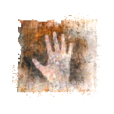Please wait a few moments while we process your request

Sandro Canavezzi de Abreu
(Salto, Brazil)
Sandro Canavezzi de Abreu has studied architecture and urbanism at the University of São Carlos in Brazil and worked as an architect. During the final years of his studies, he became interested in new media interfaces as embedded within urban settings. As a result, he dreamed up the project Synthetic Park of São Paulo, a cultural centre located within a central area of the city that would be connected to other similar parks in the world in an effort to share live events. Canavezzi later completed post-graduate work in new media at the University of São Paulo.
From 1997 to 2000, he took part in the IO_Dencies project organized by the group Knowbotic Research and worked as one of the senior editors for this initiative in São Paulo. He was actively involved in setting up a database for the city consisting of documents (texts, images, sounds) that conveyed the urban experience. The processing of this information by technologies developed by Knowbotic Research enabled force fields between the different data to be visualized thanks to experimental interfaces. This project's goals were to facilitate involvement via the network and to offer tools for rethinking urban space.
Later, Canavezzi completed a residency at the Podewil contemporary art centre in Berlin during which he learned to program. There he collaborated with Ulrike Gabriel of Codelab-Berlin, a group interested in creating software and hardware within projects that view programming as an artistic material. During his residency, he put together M(n)EMO, a prototype of a physical interface that evolved out of his thoughts on interactivity. This project was presented at Blue Rodeo (2002), a festival featuring performances, lectures and installations created during residencies at Podewil.
Individual-machine interfaces have intrigued Canavezzi throughout his career, whether within joint projects or more recently in his own project M(n)EMO. In this recent project, he favours individual experimentation so that the notion of interface can be examined more intimately and conceptually.
From 1997 to 2000, he took part in the IO_Dencies project organized by the group Knowbotic Research and worked as one of the senior editors for this initiative in São Paulo. He was actively involved in setting up a database for the city consisting of documents (texts, images, sounds) that conveyed the urban experience. The processing of this information by technologies developed by Knowbotic Research enabled force fields between the different data to be visualized thanks to experimental interfaces. This project's goals were to facilitate involvement via the network and to offer tools for rethinking urban space.
Later, Canavezzi completed a residency at the Podewil contemporary art centre in Berlin during which he learned to program. There he collaborated with Ulrike Gabriel of Codelab-Berlin, a group interested in creating software and hardware within projects that view programming as an artistic material. During his residency, he put together M(n)EMO, a prototype of a physical interface that evolved out of his thoughts on interactivity. This project was presented at Blue Rodeo (2002), a festival featuring performances, lectures and installations created during residencies at Podewil.
Individual-machine interfaces have intrigued Canavezzi throughout his career, whether within joint projects or more recently in his own project M(n)EMO. In this recent project, he favours individual experimentation so that the notion of interface can be examined more intimately and conceptually.
Sylvie Parent © 2003 FDL


